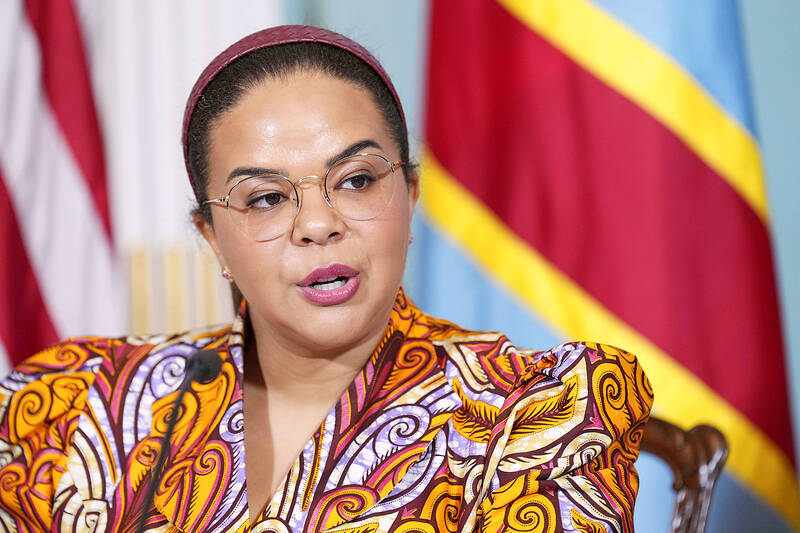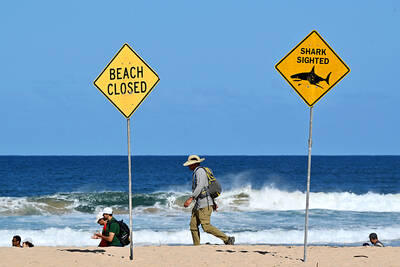The Democratic Republic of the Congo (DR Congo) has accused the EU of “an obvious double standard” for maintaining a minerals deal with Rwanda to supply Europe’s high-tech industries when it deployed a far-wider sanctions regime in response to the war in Ukraine.
Congolese Minister of Foreign Affairs Therese Kayikwamba Wagner urged the EU to levy much stronger sanctions against Rwanda, which has fueled the conflict in the eastern DR Congo, describing the bloc’s response to breaches of the DR Congo’s territory as “very timid.”
Referencing the EU’s response to Russia’s invasion of Ukraine, she said: “It is an obvious double standard — I want to be constructive here — that makes us curious and inquisitive about understanding why the EU again struggles so much to take action.”

Photo: AP
The DR Congo and Rwanda signed a peace deal in June, brokered by the US and Qatar, aiming to end the decades-old conflict, which escalated early this year when the
The Rwanda-backed M23 rebel group seized swathes of DR Congo territory, including two key cities. However, deadly attacks on civilians have continued, and a deadline to reach a peace agreement was missed in August.
Last year, UN experts said up to 4,000 Rwandan troops were fighting alongside M23 and that the Rwandan military was in “de facto control of M23 operations.”
Rwanda has long denied backing M23 and says its forces act in self-defense.
Congolese President Felix Tshisekedi on Thursday appealed to his Rwandan counterpart, Paul Kagame, to stop supporting militants in the DR Congo at a Brussels event attended by both leaders.
Saying he was stretching out his hand to make peace, Tshisekedi told Kagame: “This requires you to order the M23 troops supported by your country to stop this escalation, which has already caused enough deaths.”
Rwandan Minister of Foreign Affairs Olivier Nduhungirehe on X said Tshisekedi was “completely mistaken,” adding that he abused the platform at the Brussels event.
Speaking before the meeting, Wagner drew parallels between Rwanda’s violation of DR Congo territory and Russia’s invasion of Ukraine.
The EU had adopted a catalogue of sanctions against Russia, but made only “very timid progress” over the conflict in eastern DR Congo, she said.
The eastern DR Congo, a region bordering Rwanda with abundant natural resources, but plagued by non-state armed groups, has experienced extreme violence for more than three decades.
The EU has placed sanctions on 32 people and two entities — a militant group and a Rwandan gold refiner dealing in illegal supplies of the metal — for their role in fuelling the conflict.
Setting out justifications for these sanctions, the EU said the Rwandan Defence Force in eastern DR Congo had violated the DRC’s territory and “sustains the armed conflict ... [and is] also responsible for serious human rights abuses, including collective punishment.”
Despite this finding of human rights abuses by the Rwandan army in the DR Congo, the European Commission has brushed off calls to suspend a minerals deal with Kigali it signed last year, which is intended to boost the supply of raw materials to power Europe’s electric car batteries and microchips.
Wagner was in Brussels to take part in a conference on the “Global Gateway,” Europe’s lower-budget answer to China’s Belt and Road Initiative, which aims to finance infrastructure projects around the world.
European Commission President Ursula von der Leyen opened the conference on Thursday, saying the EU wanted “partnerships based on common interests and respect for sovereignty.”
She highlighted the Lobito corridor — rail, road and water transport links — connecting the mineral heartlands of the DR Congo and Zambia to Angola’s Atlantic coast.

With much pomp and circumstance, Cairo is today to inaugurate the long-awaited Grand Egyptian Museum (GEM), widely presented as the crowning jewel on authorities’ efforts to overhaul the country’s vital tourism industry. With a panoramic view of the Giza pyramids plateau, the museum houses thousands of artifacts spanning more than 5,000 years of Egyptian antiquity at a whopping cost of more than US$1 billion. More than two decades in the making, the ultra-modern museum anticipates 5 million visitors annually, with never-before-seen relics on display. In the run-up to the grand opening, Egyptian media and official statements have hailed the “historic moment,” describing the

SECRETIVE SECT: Tetsuya Yamagami was said to have held a grudge against the Unification Church for bankrupting his family after his mother donated about ¥100m The gunman accused of killing former Japanese prime minister Shinzo Abe yesterday pleaded guilty, three years after the assassination in broad daylight shocked the world. The slaying forced a reckoning in a nation with little experience of gun violence, and ignited scrutiny of alleged ties between prominent conservative lawmakers and a secretive sect, the Unification Church. “Everything is true,” Tetsuya Yamagami said at a court in the western city of Nara, admitting to murdering the nation’s longest-serving leader in July 2022. The 45-year-old was led into the room by four security officials. When the judge asked him to state his name, Yamagami, who

‘CHILD PORNOGRAPHY’: The doll on Shein’s Web site measure about 80cm in height, and it was holding a teddy bear in a photo published by a daily newspaper France’s anti-fraud unit on Saturday said it had reported Asian e-commerce giant Shein (希音) for selling what it described as “sex dolls with a childlike appearance.” The French Directorate General for Competition, Consumer Affairs and Fraud Control (DGCCRF) said in a statement that the “description and categorization” of the items on Shein’s Web site “make it difficult to doubt the child pornography nature of the content.” Shortly after the statement, Shein announced that the dolls in question had been withdrawn from its platform and that it had launched an internal inquiry. On its Web site, Le Parisien daily published a

DEADLY PREDATORS: In New South Wales, smart drumlines — anchored buoys with baited hooks — send an alert when a shark bites, allowing the sharks to be tagged High above Sydney’s beaches, drones seek one of the world’s deadliest predators, scanning for the flick of a tail, the swish of a fin or a shadow slipping through the swell. Australia’s oceans are teeming with sharks, with great whites topping the list of species that might fatally chomp a human. Undeterred, Australians flock to the sea in huge numbers — with a survey last year showing that nearly two-thirds of the population made a total of 650 million coastal visits in a single year. Many beach lovers accept the risks. When a shark killed surfer Mercury Psillakis off a northern Sydney beach last